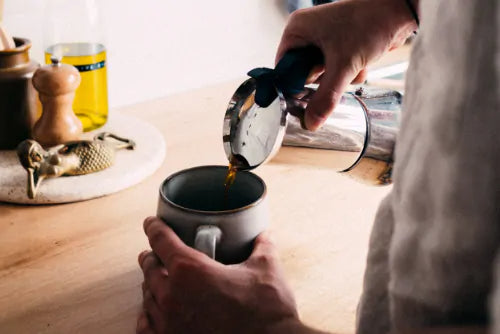
Coffee and your health
Drinking coffee has a positive effect on your heart and your health. Did you know that coffee is even on the food pyramid of the Dutch Nutrition Centre? It is low in calories (provided you drink it without milk and sugar) and good for maintaining your fluid intake. But coffee is also linked to cholesterol. How does that actually work? We investigated.
Coffee and cholesterol
When one of our crew members heard that her cholesterol was on the high side and that coffee affects your cholesterol, she was shocked. Should she stop drinking coffee?! She is surrounded by the most delicious coffee all day at work. Try to stay away from that. My colleague went to investigate.
The good news: she can continue drinking coffee. And so can you! You may have to make some adjustments to the way you make your coffee. Chances are, however, that the way you make your coffee now is perfectly fine.
What is cholesterol?
One more thing: Cholesterol is an important building block for your body cells. Cholesterol comes in two varieties: HDL - the good cholesterol, and LSL - the bad cholesterol. On the one hand, it is produced by your body itself. Mostly by your liver and a little by your adrenal glands and your intestines. On the other hand, you get it through your food. Coffee beans contain two fatty substances, cafestol and kahweol. If you leave these in your coffee, they can increase your cholesterol level.
You can filter them out of your coffee
The good news is that you can filter out most of these fatty substances and most of us already do. If you are watching your cholesterol levels, these four filtering methods below are the best to use:
1. The paper pour filter
Pouring the coffee into a filter so that the jug slowly fills up: Our grandparents did this and they were absolutely right. This way of brewing is hip again these days and therefore also good for your health. You get a lot more of the fatty substances out of it here.
2. Coffee pads - mini filters
A coffee pad , such as the ESE pads, actually packs your coffee in a kind of mini filter. This way, too, the fatty substances are filtered out of your coffee. Do you like this way of making coffee and the large variety of coffee flavors that you can easily get at home with it? You don't have to do it for your cholesterol level.
3. Instant coffee - already filtered
This coffee is also well filtered. Instant coffee is made by brewing very large quantities of coffee with very large … filters. This coffee is then dried so that you can quickly and easily drink a nice cup of coffee at home. You can also simply drink this coffee if you want to pay attention to your health.
4. The percolator - filters from above
Are you also so fond of those small percolators? Fortunately, this is also simply another way of filtering your coffee. The hot water rises via a small tube and then ends up on top of your coffee. It is then filtered and then descends into the lower part of your percolator.
Moderate filtering
Some people make coffee using an espresso machine, an Italian coffee pot (the water is then pressed from the bottom to the top) or via cups. The fatty substances are also filtered out, but more of them remain than if you use one of the first four methods mentioned.
Fortunately, the Nutrition Center says that you can still drink up to four cups of this method of making coffee per day.
Little to no filtering
Coffee that is hardly filtered is boiled coffee. This is also called the Turkish or Greek way of making coffee. And although you make delicious coffee with this, you unfortunately do not remove the cholesterol-raising substances. If you want to pay attention to your health, it might be a good idea to switch to a different way of making coffee.
Conclusion
You can still enjoy your coffee as long as you pay attention to the way you brew your coffee. My colleague discovered that she was using the Italian coffee pot method. She has now switched to pouring water through the old-fashioned - or should we say: hip again - coffee filter.
Coffee is too delicious and has too many health benefits to not drink. Fortunately, you don't have to give up coffee if you have high cholesterol.
Please note: these recommendations are general in nature. Always consult a doctor or dietician about your specific medical situation!
















